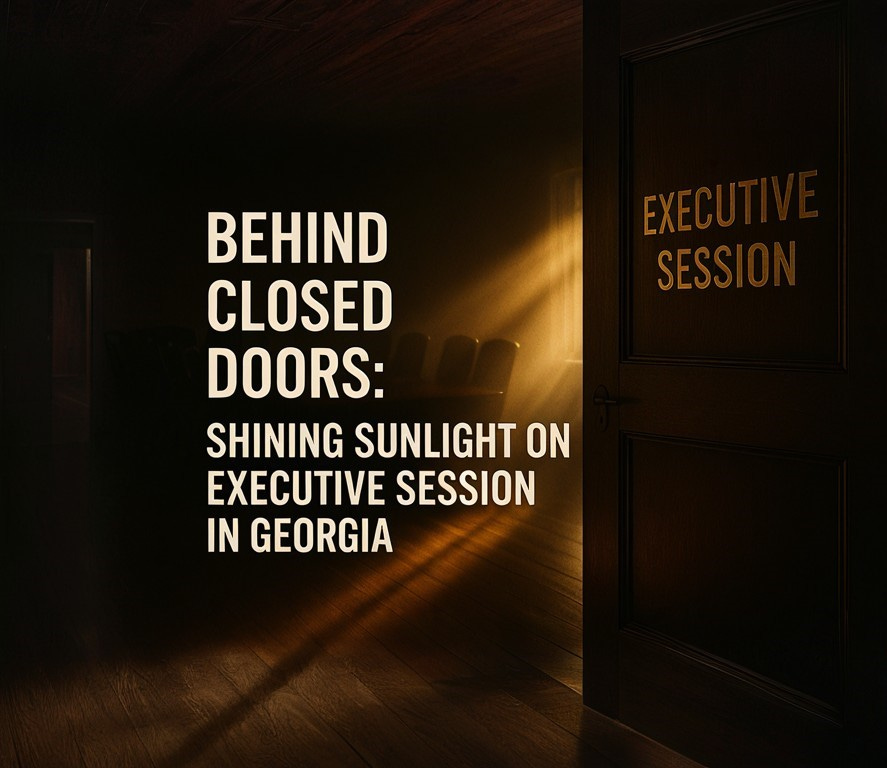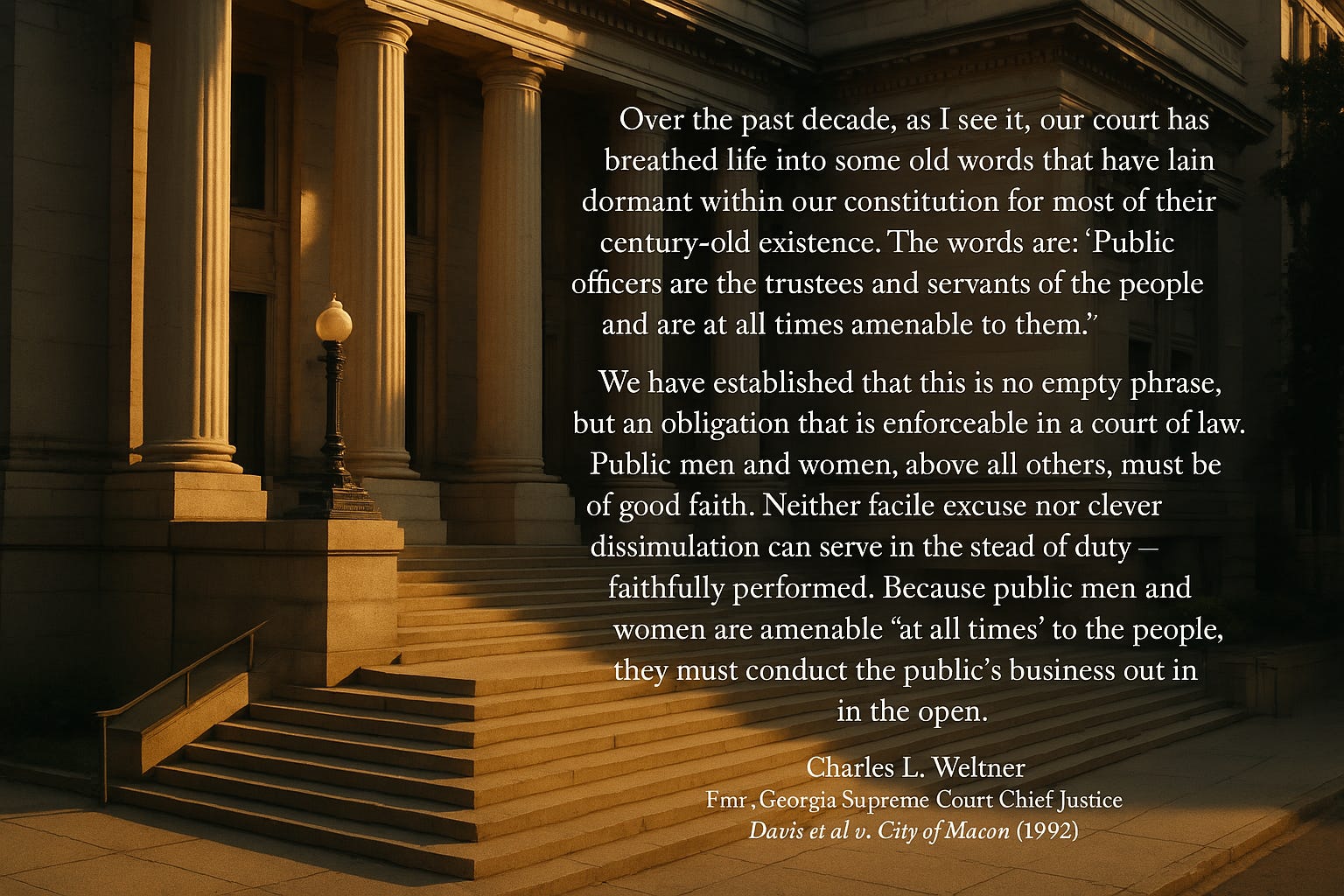Behind Closed Doors: Shining Sunlight on Executive Session in Georgia
The public's business belongs in public view. Period
In government, secrecy is not a virtue.
Yet across Georgia—in counties, cities, and school boards—executive sessions have become the preferred refuge for local officials sometimes reluctant or unwilling to conduct public business in public view.
For those new to public office, understand this distinction clearly: there's a profound difference between what's legally permissible and what's ethically appropriate. Between what you're allowed to do and what you ought to do.
Nowhere is this line more consistently blurred than in the context of the problematic executive sessions ubiquitous in state and local governments.
When the Door Closes, Accountability Disappears
Every newly elected official receives orientation on laws and procedural rules. Between ceremonial photographs and official paperwork, a lawyer—typically one who works for the board or a government, not the public—will give them the rundown on when it’s “okay” to close the door and shut out the people who elected them.
They'll talk about attorney-client privilege with reverence. They'll speak with authority about "pending litigation," "real estate strategy," or "personnel privacy concerns." The impression given is that confidentiality is somehow fundamental to governance. That closing the door is often required.
It isn't.
Georgia law permits executive sessions under specific, limited circumstances. It does not require them. This isn't a subtle distinction—it's the central issue.
Each time a governing body chooses executive session—closed-door deliberations, it's precisely that: a choice that prioritizes institutional comfort over public transparency.
The Open Meetings Act: A Floor, Not a Ceiling
Georgia's Open Meetings Act doesn't give governments or officials a license for conducting public business in secret. It establishes narrow exceptions to the foundational principle that governing should happen in full view of the governed. Courts have consistently held that these exceptions must be interpreted narrowly, not expansively.
In practice:
The real estate exception applies to specific property transactions where public disclosure would compromise negotiating position—not for general discussions about development priorities or zoning philosophies.
The personnel exception covers hiring, evaluation, or disciplinary matters concerning specific individuals—not broad discussions of staffing policies, organizational structure, or whether to renew a superintendent's contract well ahead of deadline.
The invocation of attorney-client privilege? It applies to discussions of actual pending litigation, settlement, or other judicial actions. Additionally, the mere presence of an attorney does not magically cloak a meeting in secrecy. The threat of litigation must be "realistic and tangible," not a mere speculative fear.
A simple test applies: If board members would be uncomfortable explaining their closed-door discussions to constituents the next morning, those discussions likely shouldn't be happening behind closed doors.
The Legal Oath and Public Trust
What deserves more scrutiny is the legal affidavit requirement. After every executive session, officials must sign a sworn statement attesting they discussed only legally permitted topics. This isn't mundane paperwork—it's a legal document carrying the weight of criminal penalties.
Yet how many officials sign these affidavits routinely, perhaps with minimal reflection on whether boundary-crossing conversations occurred? The casual approach to these sworn statements represents a fundamental integrity problem. When elected officials treat legal attestations as an afterthought rather than solemn commitments, public trust inevitably erodes.
The common defense—that officials "won't speak candidly" in public—deserves particular scrutiny. Public service fundamentally requires public accountability. Officials unwilling to express their authentic positions before their constituents have misunderstood the nature of their role. Governing isn't about comfort; it's about trust and transparency.
The Right to Speak Truth
Contrary to widespread belief, Georgia law does not prohibit elected officials from discussing or revealing anything said or addressed during executive session. While norms of confidentiality exist, their First Amendment rights as an official remain intact. If they believe the public interest is best served by transparency regarding closed-door discussions, no state law prevents an official from speaking or discussing matters from executive session.
Colleagues may object. Political consequences may follow. But they cannot legally remove them from office, strip voting privileges, or formally censure them simply for truthfully informing constituents about matters they believe people deserve to know.
A related bad practice is emerging from executive session to vote on vaguely described "recommendations as discussed." Georgia law requires votes to be clear and descriptive. When the public cannot determine what precisely is being approved, the spirit of open transparent government is violated, regardless of technical compliance.
Legislative Reform Needed
Georgia's transparency laws require modernization. The Open Meetings Act and Open Records Act were established before digital communication became standard, and numerous ambiguities allow for evasion of their intent. The General Assembly should:
Comprehensively look at what to do about executive session abuse and look at alternatives or elimination.
Tighten definitions of permissible executive session topics, at minimum
Establish accessible and clear enforcement mechanisms for the public, including an affordable court access option
Implement meaningful penalties for violations
Mandate digital accessibility standards
Address excessive fees for public records access
Much more
Other states have implemented stronger sunshine provisions with clear benefits for public confidence. Georgia should join them.
Walker County Schools Executive Sessions Violate Open Meetings Laws
In 1788, when our country was in it’s infancy, a prescient patriot named Patrick Henry sounded an alarm about Government behind closed doors. "The liberties of a people never were, nor ever will be, secure," Henry proclaimed, "when the transactions of their rulers may be concealed from them."
The Path Forward: Governance in Daylight
Supreme Court Justice Louis Brandeis wasn't just being clever when he said "sunlight is the best disinfectant." He was getting at something essential; a fundamental principle that goes back to the American founding. Transparency isn't an inconvenience to be minimized—it's the cornerstone of public trust.
Before heading behind closed doors, officials should honestly ask themselves: Do we really need privacy for this, or are we just avoiding tough public conversations, or is it just convenience? Are we protecting sensitive information, or protecting ourselves? Are we just going behind closed doors because that's how it's been done or that's how the some employees or officials want it?
The law sets minimum standards. True public service aims higher.
Serve in the light. Or don't serve at all.





